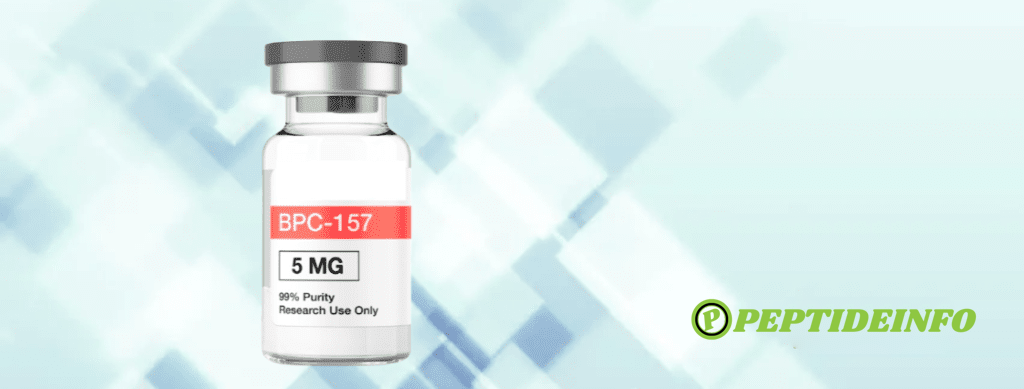What is BPC-157?
BPC-157 is a pentadecapeptide composed of a string of 15 amino acids. It was first isolated in 1991 and is a fragment of the Body Protection Compound that occurs naturally in human gastric juice. BPC-157 is primarily known for its healing and restorative properties, such as promoting angiogenesis—the process of forming new blood vessels.
While the mechanism of action for BPC-157 is still unclear, it is believed to entail the upregulation of growth factors, the modulation of nitric oxide (NO) synthesis, and the control of functions of collagen fragments that are associated with bone morphogenic proteins [1].
BPC-157 can play an essential role in the functioning of the GI tract, where it can combat adverse conditions such as gastro-intestinal cramps, leaky gut, and Crohn’s disease [2]. In addition, BPC-157 has also been shown to accelerate recovery in tendon injuries and burns to the skin by promoting blood flow to affected areas, as well as offering neuroprotective properties and enhanced muscle growth.

BPC-157 Benefits
A number of studies have indicated that BPC-157 can provide beneficial effects when administered to test subjects, including:
Protects Stomach Cells, Maintains Gastric Integrity, and Prevents Stomach Ulcers
Naturally occurring BPC is continuously present in human gastric juice and is stable. According to a recent study, BPC-157 is an anti-ulcer peptidergic agent that “protects stomach cells and maintains gastric integrity” [3]. It has been proven in clinical trials to be safe for the treatment of inflammatory bowel disease [4].
Improves Energy Levels, Blood Flow, and Vessel Recruitment
Studies have shown that BPC-157 helps reestablish the integrity of blood flow by improving blood vessel recruitment [3]. It promotes the formation of blood vessels via a process known as angiogenesis, and upregulates vascular endothelial growth factor (VEGF), a protein that stimulates blood vessel growth.
Animal studies have shown that BPC-157 has a modulatory effect on angiogenesis in muscle and tendon healing [5]. An early study involving chicks found that BPC-157 increased the production of nitric oxide (NO) and helped to prevent the development of pulmonary hypertension syndrome and tissue lesions [6]. In addition, this activation of NO pathways can provide increased energy levels—NO activators are also common ingredients in pre-workout supplements.
Provides Neuroprotective Properties
One rat study indicates that BPC-157 may offer neuroprotective properties [7]. The peptide appears to repair nerve damage caused by alcohol intoxication and reduce rates of depression in animals exposed to chronic stress.
In addition, a 2014 study found that BPC-157 limited the severity of the damage done by methamphetamine-induced neurotoxicity in rats [8].
BPC-157 also appears to protect the skin, heart, liver, pancreas, and brain against “the adverse effects of alcohol and nonsteroidal anti-inflammatory drugs (NSAIDs)” [3]. Another 2013 study noted that “BPC-157 may be used as an antidote against NSAIDs” [4] and research interest in BPC-157 for this purpose remains strong.
Offers Treatment for Wound Healing and Traumatic Brain Injury
In studies involving mice with traumatic brain injury (TBI), BPC-157 has been shown to have a positive effect on survival rates compared with placebo and reduced levels of post-injury damage [9, 10]. The angiogenic properties of BPC-157 allow the peptide to expedite wound healing as a result of increased blood flow to the affected area.
Combats Inflammation
Animal studies have shown that BPC-157 has a significant anti-inflammatory effect on periodontal tissues in rats with ligature-induced periodontitis. Researchers noted that “BPC-157 treatment significantly reduced both plasma extravasation, histological alterations and alveolar bone resorption” without negatively affecting blood circulation [11].
Stimulates Muscle and Tissue Growth
BPC-157 has been shown in test tube studies to stimulate growth hormone receptor expression. Administration of this peptide can promote the growth of new tissue, with the potential of also stimulating bone, skin, and muscular growth [1].
BPC-157 Side Effects
Most research involving BPC-157 has involved animal models in which certain side effects have occasionally been observed. One study concluded that “clinical trials involving BPC-157 have shown that it is a safe treatment for inflammatory bowel disease” [3]. Further evidence also states that “stable gastric pentadecapeptide BPC 157 is an anti-ulcer peptidergic agent, proven in clinical trials to be both safe in inflammatory bowel disease and wound healing, stable in human gastric juice, with no toxicity being reported” [12].
Based on the limited research available we can see that documented BPC-157 side effects include [4]:
- Injection site injuries (redness, scarring, etc)
- Nausea
- Fatigue
- Sweating
- Light-headedness
Research into BPC-157’s long-term side effects is lacking, warranting further investigation.
BPC-157 Dosage Guide
Despite strong research interest in BPC-157 dosage, there have yet to be standardized and universally agreed upon recommended dosage guidelines for BPC-157 in test subjects. However, by drawing on data in published studies, we can summarize the main ways that researchers have dosed BPC-157 in past experiments.
How is BPC-157 Administered
While oral solutions and transdermal patches containing BPC-157 have been tested in past trials, the generally preferred route of BPC-157 administration is via injection (IM or subcutaneous).
Researchers interested in studying BPC-157 should abide by all established safety protocols when administering this peptide, including the using sterile needles for injection and bacteriostatic water for reconstitution, and refrigerating the peptide following its reconstitution.
Recommended Dose
The recommended dose for BPC-157 can vary depending on the test subject and the research objective. In animals studies, BPC-157 has been administered in the following ways:
- To rats at a dose of 10 mcg/kg via injection [12]
- To mice at a dose of 10 μg or 10 ng/kg body weight intraperitoneally (i.p.) via injection [14]
- To mice as a thin layer of cream topically (50 μg of BPC 157 dissolved in 2 ml of distilled water with 50 g of commercial neutral cream and 1% white silver sulfadiazine).
BPC-157 has been administered at similar doses in four other rat experiments:
- To investigate its role in accelerating musculoskeletal soft tissue healing in rats [15]
- To improve the healing course of spinal cord injury and lead to functional recovery in rats [16]
- To investigate the speed at which tendons healed in rats [17]
- To test its effects on short bowel syndrome in rats [18]
It should be noted that per kg dosage for rodents does not scale to humans.
Sample BPC-157 Protocol
Based on the research we have covered herein, a total daily dose of injectable BPC-157 should generally not exceed 1mg. We provide the following sample BPC-157 injury recovery protocol for reference purposes only:
- Daily Dosage: 250mcg-750mcg of BPC-157
- Frequency: For first half of study, administer two to three injections of 250mcg each, spread throughout the day. For second half of study, administer one to two injections of 250mcg each.
- Study Duration: Four to six weeks, depending on subject’s responsiveness and nature of injury.
- BPC-157 Cycle: BPC-157 is typically not “cycled” in injury recovery contexts; rather, it is studied for its ability to achieve a given outcome.
- Notes: Our preferred vendor, presented below, sells vials of 5mg BPC-157 and 10mg BPC-157—the 5mg vial would suffice for most injury recovery studies based on this protocol. For advanced injury recovery, BPC-157 is typically administered alongside TB-500.

Where to Buy BPC-157 Online? | 2024 Edition
While BPC-157 is readily available online, some researchers may be curious about the best places to source it as a reference material.
To answer this question, our team made small test orders with various vendors to see which ones offered the highest quality peptides, fastest shipping times, and best customer service.
Here are our top two picks:
Research Peptide
Research Peptide is a great option for researchers looking to buy high-quality BPC-157 for their next study.
Here’s why they’re a good pick:
- High-Purity Compounds: Research Peptide is committed to producing the highest quality peptides. They submit all peptide batches for quality testing via HPLC-MS analysis. This ensures their peptides are research-grade and exceptionally pure.
- Rapid Shipping: Many orders ship out the same day they are placed, allowing researchers to get to work quickly. FedEx two-day shipping comes standard, and overnight options are available to researchers with Research Peptide. They also offer international shipping options.
- Shipping Insurance: Research Peptide also offers affordable shipping insurance to give peace of mind to the research community. Researchers can buy with confidence here.
- Researchers Come First: True to its promise of researcher satisfaction, Research Peptide shines when it comes to providing phone and email support. They have 7-days a week support available to researchers.
- Great Payment Options: Research Peptide accepts credit cards, which is ideal. As well, they accept e-check, Cash App, and cryptocurrency payments.
One unique aspect of with this research peptides vendor is the variety of BPC-157 formulations. Research Peptide offers lyophilized powder BPC-157, along with other offerings like:
- BPC-157 + TB-500 Nasal Spray
- BPC-157 Capsules
Don’t forget, qualified researchers get a 10% discount on the next order with Research Peptide. Click the button below and use this code:
peptideinfonet10
Buy BPC-157 from our top-rated vendor…
Research Peptide
Research Peptide sells 99% pure BPC-157 to leading researchers and has a stellar reputation.
Here’s what they do very well:
- Third-Party Testing: Research Peptide gets every batch of BPC-157 tested by a third-party laboratory, with the test results published online on the product pages.
- Friendly Support and Service: Researchers can email a dedicated support team with any peptide or order-related question and expect a personalized response in one business day.
- Same-Day Shipping: Research Peptide offers same-day or next-day shipping on all orders. This ensures researchers get peptides in a timely manner.
Furthermore, Research Peptide offers researchers a BPC-157 + TB-500 blend and stable BPC-157 capsules.
Buy research peptides from Research Peptide today…
Bacteriostatic Water and BPC-157
In addition to BPC-157, researchers will need to have the right supplies on hand for proper peptide handling.
The procedures of peptide reconstitution and storage call for a handful of items, namely bacteriostatic water, sterile essentials, and sterilizing alcohol wipes.
The Research Peptide team has done the market research to identify the best online retailer of research supply essentials.
BPC-157 Benefits | Verdict
Research conducted on BPC-157 indicates that this peptide has a number of beneficial effects when administered to test subjects, such as increased rates of wound healing, neuroprotective properties, and even raising energy levels. This guide has summarized the findings of published studies and highlighted areas where further research may be warranted.
Those who choose to conduct research with BPC-157 should keep in mind that while this peptide can confer several benefits, there is also a risk of test subjects incurring mild side effects, such as nausea, fatigue, sweating, and light-headedness.
Due to the limited availability of relevant data, the long-term side effects of BPC-157 are mostly unknown, and so caution is advised when evaluating the effects of this peptide.
To obtain research-grade BPC-157 at a fair price, head over to our top-rated vendor.


